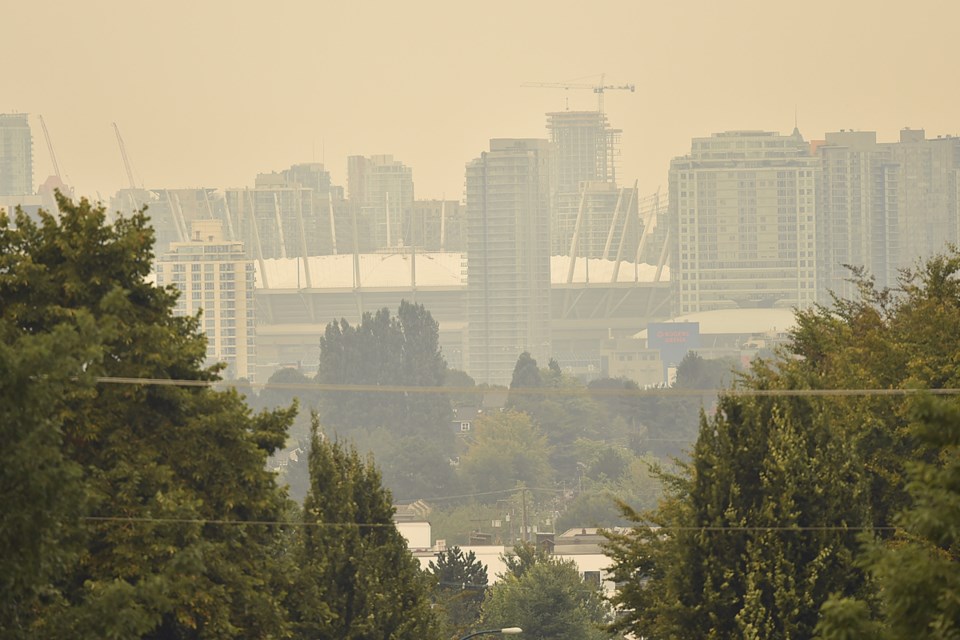Vancouver and the surrounding region are once again under an air quality advisory with the return of hot weather and hazy skies.
Metro Vancouver Monday issued an air quality advisory for Metro Vancouver and the Fraser Valley due to high concentrations of particulate matter. The current weather pattern has brought smoke from wildfires in the Interior and Washington state into the region.
The hot weather also brings the potential for increased concentrations of ground-level ozone, which can affect air quality. Ground-level ozone is formed when pollution reacts in the air in the presence of sunlight. The highest levels of ground-level ozone are usually seen between mid-afternoon and early evening on summer days.
The smoky skies are helping to temper some of the heat, at least temporarily. Daytime temperatures are expected to only hit the mid-20s near the coast and the low 30s inland Tuesday. The hot, smoky weather is expected to continue throughout Wednesday.
“The concentration and location of wildfire smoke will be a wildcard factor for forecasting temperatures and will affect the potential for records to be broken,” Environment Canada said in a statement Tuesday morning. “Smoke blocks the transmission of sunlight and can significantly lower daytime highs.”
The forecast calls for an onshore flow to develop starting Thursday, bringing cooler temperatures and pushing the smoke east. Widespread showers are expected to return to the south coast Thursday through to Saturday.
With the air quality advisory, Metro Vancouver is warning residents to avoid strenuous outdoor activities, particularly during mid-afternoon and early evening. Exposure to ozone and fine particulate matter is particularly a concern for infants, the elderly and those who have underlying medical conditions, such as lung disease, heart disease, diabetes or asthma.
The City of Vancouver has several measures in place to help residents stay cool. Temporary water fountain have been installed at several locations in the city -- Ontario Street and East First Avenue, Commercial Drive and East Broadway, Granville Street and West 70th Avenue, East Hastings and Heatly Street, and Robson and Bidwell streets. Misting stations have also been installed in four parks -- Andy Livingstone, Oppenheimer, Thornton and Emery Barnes.
Tips to beat the heat:
• The best way to stay cool is air conditioning. If you don’t have air conditioning at home, seek it out in other places — malls, libraries, community centres, restaurants, movie theatres. This can also provide respite from poor air quality.
• Use public splash pools, water parks or pools, or take a cool bath or shower.
• Fans are less effective at higher temperatures, and can actually increase dehydration, Brauer said. Applying a cool water mist or wet towels to your body prior to sitting in front of a fan is a quick way to cool off.
• Dress for the weather. Wear loose, lightweight clothing and protect yourself from the sun with a wide-brimmed hat and sunglasses.
• Avoid sunburn by staying in the shade or use sunscreen with a SPF of 30 or more.
• Keep your home cool by opening windows and keeping shades or blinds closed. Use an air conditioner, if possible, and prepare meals that do not require an oven.
• Limit outdoor activities to early morning and evening.
• Stay hydrated by drinking cool, non-alcoholic beverages throughout the day. Don’t wait until you’re thirsty.
Signs of heat-related illness:
• Extreme thirst
• Dizziness and/or fainting
• Confusion
• Weakness
• Nausea and vomiting
• Rapid breathing and heart rate
If you see someone you suspect is suffering from too much heat, call 911 and help keep them cool — move them to air conditioning, apply cool water to their face and neck — until help arrives.
@JessicaEKerr



